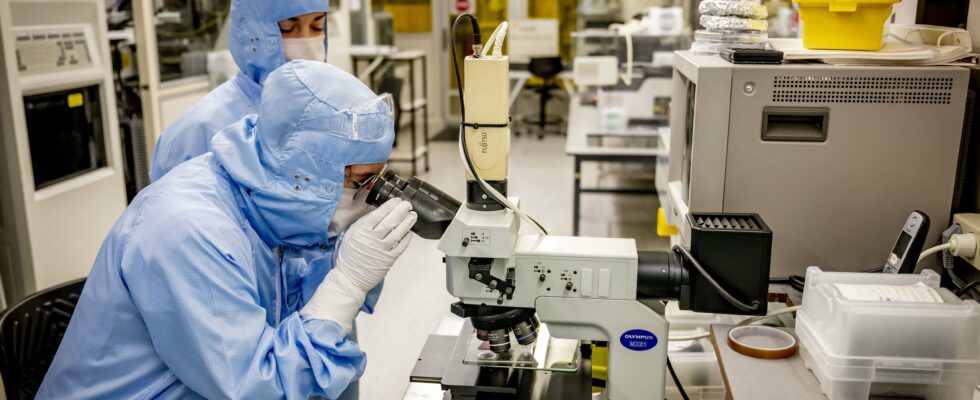This is a foreign “model” that French scientists are examining with anxiety. A model in the form of a foil, like a worrying dive into the future of France, if the National Rally won the legislative elections. In the Netherlands, a coalition led by Geert Wilders’ far-right party emerged victorious at the polls last November. Due to the particularities of the local political system, the names of the ministers and the program of this team were only recently known. Announcements concerning science and innovation panic Dutch researchers – and make their French colleagues shudder.
On the menu: drastic cuts in research budgets and a sharp reduction in the number of foreign students. “After years of underinvestment, the previous government had finally decided to respect the Lisbon commitments [NDLR : consacrer 3 % du PIB à la recherche et à l’innovation]. And now we are being told of a step backwards, with significant funding cuts,” laments Marileen Dogterom, biophysicist and president of the Royal Netherlands Academy of Arts and Sciences.
The new parties in power therefore plan to put an end to the “national growth fund” which was to allocate 20 billion euros over five years to projects bringing together academics and businesses. The last two installments, for an amount of 6.8 billion euros, will not be paid. The first three made it possible to finance dozens of projects, to support the biotech sector, innovate in education or “green” the steel industry. “These cuts are shocking, because they will reduce the potential of our country in terms of innovation,” he recently lamented to the scientific journal Science Ben Feringa, 2016 Nobel Prize in Chemistry and member of the board of directors of this fund.
Several investment plans stopped dead in their tracks
Another envelope, intended to support fundamental research, would also be cut by 150 million euros (out of a total of 500 million). As to “Sector plans”, launched last year and which were to provide 200 million euros per year to help modernize universities, they will simply be stopped. “This program aimed to further specialize the different universities, with the return of transforming the jobs of young researchers into long-term contracts,” regrets Marileen Dogterom, who now fears job cuts in the faculties.
In addition to these measures, the coalition plans a drastic reduction in the number of foreign students welcomed in the Netherlands. A shock for the scientific and academic community: in this traditionally very open nation, courses were given in English, to facilitate the arrival of students but also teachers from other countries. In a 180-degree turn from this policy, the new leaders now want a large part of teaching to be provided in Dutch…
Even if the National Rally has not specifically announced measures relating to research at this stage, its desire to reduce immigration and its very expensive program are fueling fears in our country. “With the Netherlands, we have an experimental situation which allows us to observe the decisions taken when an extreme right party is in power,” underlines Professor Alain Fischer, president of the Academy of Sciences (and columnist at L’Express). How can we explain these choices which undermine investments in the future? “This government has other priorities, tax cuts or the defense of agriculture rather than adaptation to climate change or the preservation of biodiversity. Not to mention that, for populist parties, science is often downgraded a simple opinion and not an essential area in which we should invest”, notes Marileen Dogterom.
The researcher is not giving up, however, and is impatiently awaiting the new government’s official inauguration to plead the cause of research. In the Netherlands, scientists and academics have already started to multiply their op-eds in the press and take to the streets to defend their activities. With another concern in sight: if France in turn tilts, countries reluctant to finance European projects will be ever more numerous. It is the capacity of the entire European Union to guarantee our autonomy in the future vis-à-vis other major blocs (United States, China, etc.) which would then be undermined.
.
